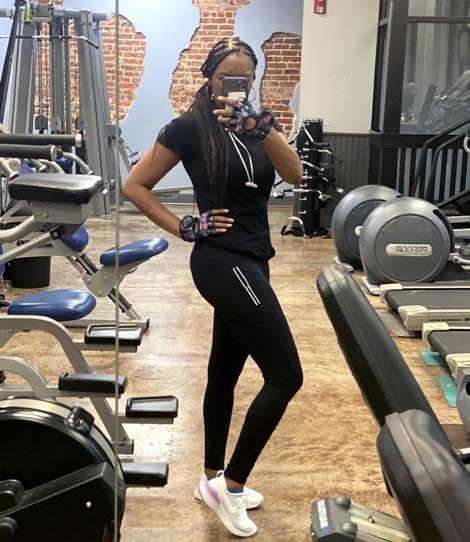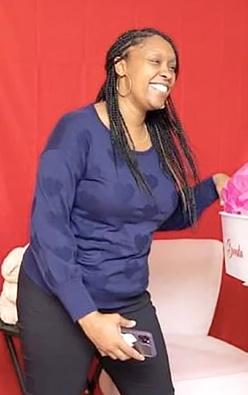
7 minute read
Covid-15 Is Real
Have You Gained Weight Since Covid Started?
An area fitness trainer tells us what we can do about it.
By Sonja Whitemon
The Covid-15 is what they call it. Harvard Health says 39 percent of its patients gained a significant amount of weight in the two years since Covid rocked our world. WebMD says 49 percent and Healthline says 61 percent. No matter the number, all agree that Americans packed on pounds.
Experts say the sudden switch to sedentary lifestyles was an obvious contributor. According to NCCI, a nonprofit research group, only six percent of U.S. employees worked from home before the pandemic. By May of 2020, that number had grown to more than 33 percent. Now, when you account for those who were not working at all, well over one-third of the U.S. workforce was at home all day.
A less obvious contributor to the pandemic weight gain phenomenon is the emotional turmoil the pandemic took on many people. Diagnoses of stress and depression skyrocketed and are still much higher than the norm before the pandemic.
According to the U.S. Department of Health and Human Services, only 8 percent of Americans experienced a major depressive episode in 2019, before Covid19 hit the U.S. By May 2021, 22 percent of people reported exhibiting symptoms associated with major depression.
Above: Melani Green before working with a personal trainer. Right: Here's Melani Green after working with a personal trainer.

Jovon Times is a personal trainer and owner of Exercise Times, a fitness center in Fort Mill, South Carolina. Times has a bachelor’s degree in fitness and wellness and an MSS in sports fitness. He also teaches weight training and fitness at Johnson C. Smith University.
Times estimates 80 percent of his personal training clients that came in after the pandemic said they gained weight during that two-year period and averaged between 20 and 30 pounds in weight gain.
He agrees that depression and stress play a big role. “A lot of my clients said they were just stressed out,” he said. “They said they felt like they couldn’t do anything. People don’t like being told that they can’t do something.”
Now that we are out of lockdowns and life for many is back to something closer to normal, people are trying to undo two years of damage. Melani Green is one of Jovon Times’ clients. Green said she sought out personal training because she, too, was stressed by the pandemic. “I am a business owner, and Jovon Times during Covid, everything was so unsure. I saw a lot of sickness and I’ve even known people to pass away from Covid-19,” she said. “You just never know where you are going to get [the virus].” She lingered in this pattern of negative thinking until she realized the next move was on her. “The only way to fight this is to work on my health.”
Melani shifted her thinking and started focusing on her wellbeing. She began working out and changed the way she eats to “clean eating,” she said. With that change of focus, Melani went from a 10-pound weight gain to losing 35 pounds.
Times said when everything shut down, people shut down. “Some people went home, sat down and did nothing for two years. Virtual training gained popularity, but it only works for people who have the discipline to do it,” he added.
Tamara Williams-Burns knows what it is like to lack motivation. She said the only walking around she did after going home to work was in her house. “I was never a big TV watcher. So, I was sitting in front of a TV eating potato chips instead of going to the gym, lifting weights and walking on the stair climber and walking on a treadmill. Although she has equipment at home, she just couldn’t bring herself to work out at home. “Sometimes you just need that motivation, you know, somebody to keep you accountable. She attributes her weight loss to personal training. With Jovon Times’ help, she said she shed 10 of the 21 pounds she gained during the pandemic.
Times said to get fit, lose weight and maintain it, you have to do things that keep you motivated. “It takes a village … people like me, friends, people around you to help you through the whole process. There will be days when you don’t want to go to the gym, but you have to go anyway.”
He believes people are well-intentioned. “People don’t get married to get divorced, people don’t get a job to get fired, and they don’t start their workout programs to quit.”
Contact Jovon Times at Exercise Times at ExerciseTimes.net. P
By AJ Barkley, Head of Neighborhood and Community Lending, Bank of America
Homebuying 101
Educational Resources to Build Your Roadmap to Homeownership
The journey to homeownership begins with building your financial know-how. According to Bank of America’s latest Homebuyer Insights Report, 88% of Black/ African Americans plan to buy a home in the next five years, but nearly one in four (23%) respondents are hesitant to buy because they don’t fully understand the homebuying process.
Can I buy a home if I’m still paying off student loans? How much money do I really need to save? What is a down payment and how does it work? If these questions and more are running through your head, you’re not alone.
Luckily, there is a wide array of educational resources and programs to help you brush up on your home buying knowledge, from in-person and online workshops, to articles and videos. With so many options at your fingertips, some of the most common questions can be answered easily through online resources.
Here are some questions our lending officers get most often – and online resources to get you started:
Debt and credit scores can be daunting topics. Confronting them head on is the first step. This starts with your first banking experience and continues as you learn to budget, save and build a solid credit history, all of which will set you up for success once you’re ready to buy.
Building financial health takes time and begins with making consistent, informed decisions. Better Money Habits® is Bank of America’s free financial education platform that offers a simple way to access relevant resources, tools and guidance to take control of your finances. Visit bettermoneyhabits. com for advice on topics such as budgeting and saving, paying down debt, homeownership, retirement, and more.
“What does all this jargon mean?”

Don’t know your LTV (which is Loan-to-Value) from your DTI (which is Debtto-Income)? It’s fair to say these homebuying terms are not a part of most people’s daily vocabulary and can make homebuying feel like learning a new language.
To demystify the process and make an informed decision, Bank of America’s First-Time Homebuyer Online Edu-Series® (bankofamerica.com/homebuyer) creates a roadmap to take you from renter to owner. Go at your own pace as experts provide guidance and tips to prepare your finances, make an offer, apply for a mortgage and more.
Many first-time homebuyers aren’t sure what they can afford, especially when taking into account costs that go beyond the monthly mortgage payment. There are the upfront costs – down payment and closing costs – and monthly payments – property taxes, homeowners insurance, plus any additional costs like utilities and upkeep of the property.
Bank of America’s new It’s Great to Be Home™ workshop provides on-demand homebuying education content for anyone who is planning to purchase a home now or in the future. The workshop covers a comprehensive range of topics, including: the benefits of homeownership, how to prepare for prequalification, how to review your credit, different types of mortgages, homebuyer assistance programs, and much more. Visit https://
homeloans.bankofamerica.com/
homebuyer-workshop to get started.
Above all, if you’re feeling anxious about the homebuying process, remember to go at your own pace. Buying a home is a big decision with long-term financial responsibility, so it is important to remember that there is no rush. If you’re planning to move in the near future or you need more time to save for a down payment, consider all your options and determine the best fit for your lifestyle. P
Bank of America, N.A., Member FDIC Equal Housing Lender ©2022 Bank of America Corporation










